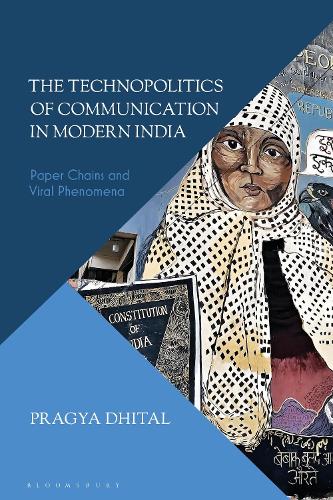
The Technopolitics of Communication in Modern India: Paper Chains and Viral Phenomena
(Hardback)
Publishing Details
The Technopolitics of Communication in Modern India: Paper Chains and Viral Phenomena
By (Author) Pragya Dhital
Bloomsbury Publishing PLC
Bloomsbury Academic
23rd January 2025
United Kingdom
Classifications
Professional and Scholarly
Non Fiction
Nationalism and nationalist ideologies and movements
320.954014
Physical Properties
Hardback
192
Width 162mm, Height 238mm, Spine 16mm
447g
Description
The Technopolitics of Communication in Modern India explores the changing role of technology in the history of political communication in India today, from newspapers, manifestos and magazines to modern social media platforms. The book looks at the way these changing media have been used to create socio-political communities of identity by both state and non-state actors a process that has become of urgent concern in the volatile, social-media fuelled age of populist politics. Pragya Dhital analyses elite communications during key moments of modern Indian political history, including World War 1, the 1975-77 emergency and the 2014 elections to build a detailed account of how political messages are shaped and received and how these dynamics now threaten liberal democracy in India today.
Reviews
An original and innovative examination of the complex processes of media and political communication in modern India, crossing boundaries between literary and textual criticism, political science and social anthropology. Dr Dhital explores political mobilisation , the operations of subversive literature, and the transmission of ideas through ephemeral literary productions with incisiveness, imagination and insight. Her conclusions about language, state media policy, censorship and electoral law are strikingly relevant to current conditions as well as to colonial and post-colonial history. This is a notably impressive debut, subtly but decisively advancing the discussion of nationalism and identity in the imagined communities of the modern world. * R.F. Foster, Emeritus Professor of Irish History, University of Oxford *
In the contemporary era of digital populism, the role of communication technologies in the formation of new political constituencies that cut across pre-existing identities has never been more important. In this brilliant analysis of political communication in modern India, Pragya Dhital explores the role of media in the formation of state and national identity. Drawing on science and technology studies (Latour), and political theorists like Jacques Rancire and Ernesto Laclau, the author shows how the figure of the people was constructed across Urdu and Hindi daily newspapers, journals and speeches, in the same way that TV and, increasingly today, internet communication technologies and social media articulate new political identities. This is a fascinating study of the technopolitics of the media in post-colonial India, and its legacy today in the populist politics of the BJP and Indian nationalism. It will appeal to scholars working across a number of different fields, including political communication, post-colonial theory and populism studies. * Saul Newman, Professor of Politics, Goldsmiths University of London *
In this sophisticated study, Pragya Dhital looks at some key moments in Indian politics through the media forms that the protagonists adopt or deploy in order to communicate with their putative publics or communities and the ways in which these, in turn shape their political publics or collectivities themselves. She calls this mutual imbrication of media forms and political address technopolitics, which serves as the crucial window into some important moments in Indian politics both in colonial and postcolonial times. It is an important study into the ways in which media technologies enable or limit the contours of politics. With respect to the 2014 elections in India and the use of social media by the BJP, Pragya Dhital relates this period of extreme political volatility directly to the rise of new digital media forms and the inability of the government of the day to keep pace with the rapid changes that were coming in its train. This is certainly an important departure from the standard ways in which Indian politics or right-wing populism for that matter is generally studied. * Aditya Nigam, political theorist based in Delhi. Formerly with the Centre for the Study of Developing Societies, Delhi *
Author Bio
Pragya Dhital is a Lecturer in the School of Advanced Study, University of London.
